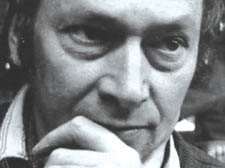|
|
 |
| |

Martin Green: quest for higher meaning |
Life among poets of the Bohemian honours list
The French Pub and the Snows of Yester-year. By Martin Green.
Poetry Monthly Press £6.50
CAMDEN'S colourful characters from the worlds of art and politics were observed by Martin Green from an early age and are depicted in The French Pub and the Snows of Yester-year collection of poems.
His own father made a living dressed as a Gypsy, playing the cello in coffee houses, when Martin was an infant living in a Gray’s Inn Road basement in the 1930s.
Both parents were committed socialists and became members of the International Brigade Association, fighting the fascist overthrow of the democratically elected government of Spain. His mother, Nan, became secretary of the London branch, based in Conway Hall, Red Lion Square (near to where the family had moved in Old Gloucester Street). His father, George, went to fight in Spain where he was killed.
By the 1960s Martin had become a literary editor living in Tottenham Street, off Tottenham Court Road, and mixed in the local pubs with poets and writers such as Louis MacNeice, John Deakin, David Wright, Alan C Breeze, Sydney Graham, and Dylan Thomas.
They form what he calls “a Bohemian honours’ list.”
Much of their vibrancy comes over in these poems, but there is also a sense that Martin’s quest for some higher meaning, through conversations with them, went unfulfilled and he was left with a feeling of emptiness.
In the poem from which the volume takes its name, the French Pub, for example he praises the writing of one of the regulars there, John Deakin, for capturing the “utter banality” of the scene. And Martin starts the volume with his own view that:
It is for the poet
To find new ways
Of suffering.
How else can
Mankind’s moral progress
Be achieved?
Therefore I say
Send me torments
None have felt before.
And torments there are aplenty: the death of Louis MacNeice (which stunned him), the gifts of artists and writers being “squandered in the bars”, his inability to talk meaningfully to his great hero Sydney Graham, and the destruction of the Scala Theatre in Tottenham Street where Peter Pan had played for so many years.
But probably the most moving poem is called “Guernica Revisited”.
It shows how United Nations delegates were completely unmoved by Picasso’s mural of Guernica (graphically exposing the horror of the Nazi bombing of Spanish civilians) which looked down at them while it was the turn of Iraqi civilians to be bombed.
Mike Pentelow
|
 |
|
 |
 |
|
 |
|



